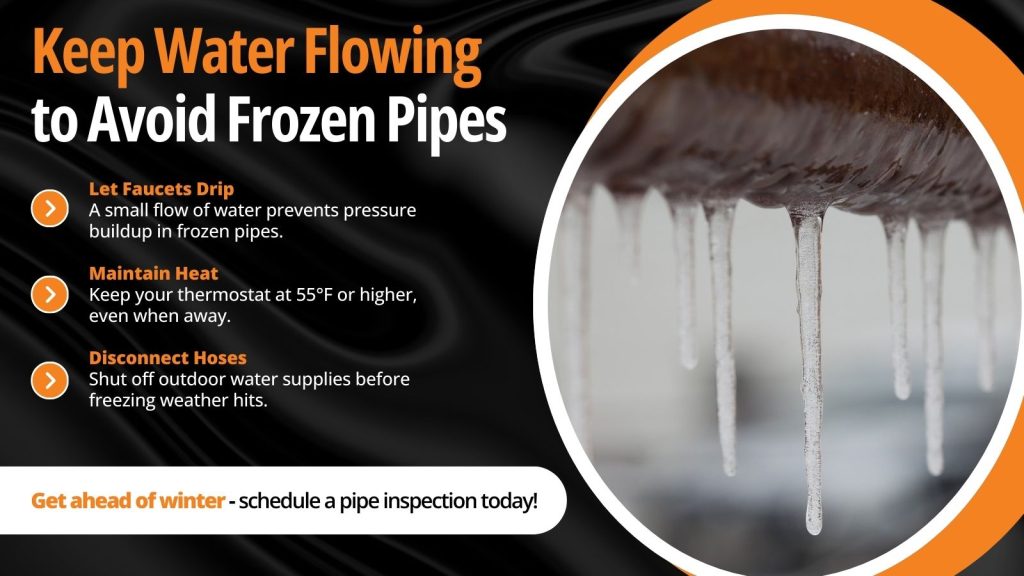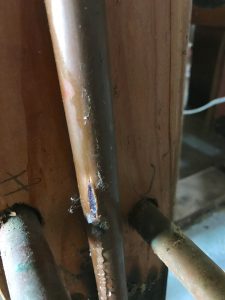Frozen pipes are a serious concern, especially in our neck of the woods. As temperatures dip down for long periods of time, the water in our pipes becomes susceptible to freezing which leads to expansion. This phenomenon occurs when water transitions to ice, causing it to expand outwards and even break solid boundaries like pipes or bottles.
The tricky part with frozen pipes comes after they thaw, when they eventually start to melt and leak everywhere through the areas where the pipes broke. This can sometimes be a catastrophic situation that requires immediate attention from a professional.
In our opinion, the best solution is prevention, so we’re going to discuss some ways to prevent burst pipes from occurring. But for your burst pipe repair in Bellingham, trust our team to get them fixed up.

Tips to Prevent Frozen Pipes During Winter
Frozen pipes are a common issue for homeowners during winter, often leading to burst pipes and costly repairs. By taking proactive measures, you can protect your plumbing and avoid the headaches that come with frozen pipes. Here are several tips to help prevent this problem:
Insulate Exposed Pipes
Pipes located in unheated areas, such as basements, attics, garages, or crawl spaces, are more prone to freezing. Insulate these pipes using foam pipe insulation, heat tape, or heating cables. This added layer of protection helps retain warmth and reduces the likelihood of freezing.
Seal Drafts and Cracks
Cold air can seep through gaps and cracks around windows, doors, and walls near pipes. Use caulk or weatherstripping to seal these openings and keep cold air out. Pay special attention to areas where plumbing enters the home, as these spots often have small gaps.
Maintain a Consistent Temperature
Keep your home’s thermostat set to a consistent temperature, even when you’re not at home. A minimum temperature of 55°F (13°C) is recommended to prevent pipes from freezing. Avoid turning the heat down too low at night, as this can increase the risk of freezing temperatures in certain areas.
Let Faucets Drip
Allowing a small trickle of water to flow through your faucets during freezing temperatures can prevent pipes from freezing. Moving water is less likely to freeze, and the slight pressure relief can help prevent a burst pipe in case of freezing.
Open Cabinet Doors
In areas where pipes are located inside cabinets, such as under sinks, leave the doors open to allow warm air to circulate around the pipes. This is especially important for pipes located against exterior walls.
Disconnect Outdoor Hoses
Disconnect and drain outdoor hoses before winter. Shut off the water supply to outdoor faucets and consider installing frost-proof hose bibs or insulating faucet covers to protect them from freezing temperatures.
Know Where the Main Water Shut-Off Valve Is
In the event that a pipe does freeze or burst, knowing the location of your main water shut-off valve can help you quickly stop the flow of water and minimize damage.
By implementing these tips, you can significantly reduce the risk of frozen pipes and enjoy a worry-free winter. Taking a few simple precautions now can save you from costly repairs and inconvenience later. But when you really need help, our team is offering $50 off any HVAC, electrical, plumbing, or chimney service whenever you need it.
Our team of Home Performance Experts has served the I-5 corridor from Blaine to Marysville, Oak Harbor to Concrete, and the San Juan Islands since 1972 with a mission of Improving Lives™. We look forward to serving you too! Contact Barron Plumbing today for burst pipe repair or pipe insulation services.

